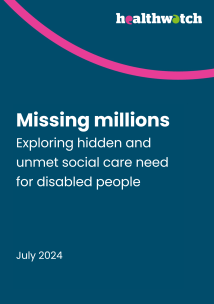Missing millions: Exploring unmet social care need for disabled adults

Our new research into social care for disabled people shows how transformative social care can be for those receiving it. But it also demonstrates the scale of unmet need. In our full report, we outline our findings and provide our recommendations to decision-makers.
Background
We set out to learn who’s accessing care, who isn’t, and why. This follows the latest official proposals for social care reform, laid out in a 2021 Government white paper, which noted in its chapter on access that:
"There is a lack of data and evidence on the extent to which care needs are not being met… We believe that better-quality data, including client-level data, will help us to:
- Understand more about who accesses care, how and with what impact.
- Better understand who is not accessing care.
- Better understand how many barriers or choices (or a mix of both) may be a cause of this.”
In this report, we aim to address that lack of data.
Our research is based on an online survey we commissioned from research company Savanta, carried out between February and March 2024. We surveyed a representative sample of 1,504 disabled adults aged 18 to 64.
Key findings
- Up to 1.5 million disabled adults in England could be eligible for social care or other support, but aren’t receiving it.
- When people receive social care support, their experiences are very positive, with 78% of disabled adults aged 18-64 agreeing that their care helped them live the lives they wanted to.
- Social care helps people stay healthy, do their favourite activities, eat and drink, work and volunteer, and look after themselves and their homes.
- Only 9% of people we spoke to disagreed that care helped them live the lives they wanted to.
- Access to social care remains a challenge. 28% of our total sample had never accessed care, despite self-identifying as eligible.
- Most people waiting for care assessments received information and support, including how long they could expect to wait for an assessment (32%) and information on what to expect.
- Around 10% of people received no support at all while waiting.
Recommendations
Based on this report’s findings, we set out the following recommendations:
- The Government must fund local authorities to raise public awareness of social care, improve ways of accessing social care services, and find potentially eligible individuals through proactive outreach and statutory information, advice, and signposting services.
- Funding should be made available to local councils to boost social care capacity and support councils in addressing existing care assessments and care package backlogs.
- Funding should be ringfenced for organisations providing independent advice and guidance related to social care.
In response to broader challenges facing social care, we set out the following recommendations for long-term and funded reforms:
- A fully funded and long-term reform plan for social care addressing:
- Workforce challenges, including retention, recognition and pay.
- A focus on prevention of care needs and support to help people live as well and as long as possible in the place they call home.
- More support for unpaid carers, including reform of Carer’s Allowance and improved access to support for themselves and those they care for.
- Expanded access to Care Act advocates to support everyone accessing a social care needs assessment.
Downloads
Download the full report below.
If you need this report in a different format, please email enquiries@healthwatch.co.uk or call 030000 68 3000.
